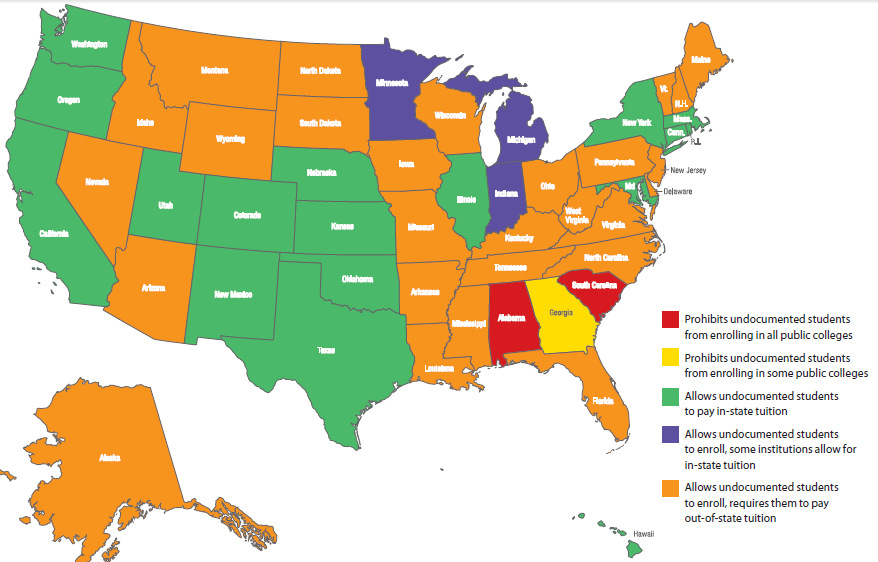HFC Considers Sanctuary College Proposal
Gallery

In November of last year, the American Association of University Professors endorsed the recommendation that colleges and universities all over the U.S. adopt what are called “sanctuary policies” in response to students’ concerns regarding the election of President Donald Trump and the potential effects of his stances on immigration. Recently, Henry Ford College’s local teacher’s union, American Federation of Teachers Local 1650, proposed its own set of sanctuary college policies, and submitted them to the college’s Board of Trustees. A college or university adopting these policies essentially identifies itself as a “sanctuary” or safe place to receive an education. Last week, HFC held a town hall type meeting with leaders in the college community to address questions and concerns about the proposed policy. Attending the event were around 250 people, the majority of whom were students and faculty. The specifics of policies proposed differ from school to school, and there may not be agreement on what exactly the term “sanctuary” means and what a “sanctuary college” should provide to its students. For public institutions, this also means considering the needs of students while remaining in compliance with the law as not to jeopardize federal funding. Thoughts on what the term means for Henry Ford and its students differs between the teacher’s union and the school administration, and the Board of Trustees, who received the proposal at the beginning of January, is still reviewing the policies.
The term can be confused with “sanctuary city,” which some at the forum raised as a serious concern. Republican legislators in several states in proposing bans on “sanctuary cities” use the term “sanctuary” to mean to protect people who have no legal right to reside in the United States. The Mirror News interviewed Dr. Lisa Copprue, Vice President of Students Affairs, who stresses that the term, as it has been proposed at HFC, is one meant to simply convey a meaning of acceptance and security.
Copprue says that a lot of the proposed policy changes are things HFC already provides. The college has partnered with local organizations like Global Detroit and ACCESS in efforts to make the campus more accepting and able to accommodate the needs of immigrant students. Recently, HFC assisted seven students from Yemen so they could change their F1 visa status to “Temporary Protected Status.” HFC’s International Office also has the Cultural Friendship Program, which pairs international students with faculty from the U.S. to develop strong social connections on campus. HFC, like many other higher learning institutions, also offers in-state tuition rates to undocumented students. “If someone were to ask for [information on undocumented students], we don’t have that, because we don’t ask students for it. It’s not required of us, and we don’t see an educational benefit in asking,” says Copprue.
Some say that’s not enough. Paul Rodgers, HFC English faculty, said at the forum meeting that the college hides the true depth of its campus diversity, presenting instead, an inoffensive corporate version. That HFC needed to address its diversity more specifically, and build and accept policies based on that idea was a central part of the conversation at the forum. For example, the University of California, though it hasn’t adopted the term “sanctuary,” has issued details on the support it will provide to undocumented students. Most notably, the campus’s Davis Law School provides legal help to students detained for deportation. Other schools, such as New Mexico State University, have rejected the idea completely. In a memo sent to students, NMSU president, Garrey Carruthers, said that the school would not take a stance on the issue, as doing so jeopardizes the funding of public institutions.
President Donald Trump issued an executive order last week to deny federal funding to “sanctuary cities.” Trump also vowed to deport undocumented immigrants.
According to McDonald, the proposal to make HFC a “sanctuary college” would protect a number of students, most notably students who are in the U.S. studying under the Deferred Action for Childhood Arrivals. “If students are fearful, or apprehensive, it’s got to have an effect somewhere on learning,” McDonald stated.
Everyone at the forum agreed on the importance of the student voice on this issue. A strong voice from the student body has the capacity to nudge decisions one way or the other. Copprue reminds us that HFC’s Student Council has resources that can be tapped into by students, and that board meetings are open to those who wish to attend. McDonald says political student organizations should take stances on issues, and get involved politically by voting and volunteering for causes or campaigns they believe in.
HFC’s chapter of Amnesty International has begun a student petition, which it plans to present at the next Board of Trustees meeting on February 20, when the “sanctuary college” proposal is expected to be discussed.
